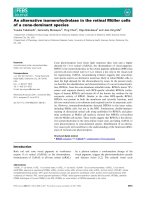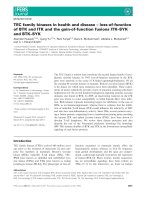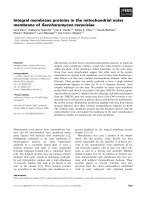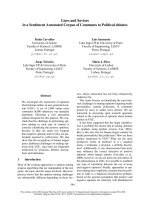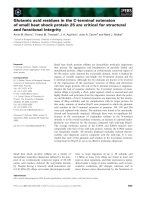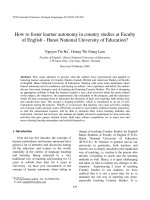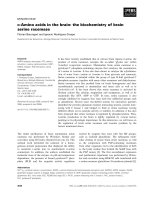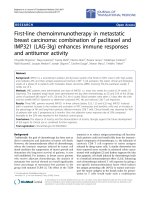Báo cáo " How to foster learner autonomy in country studies at Faculty of English - Hanoi National University of Education? " docx
Bạn đang xem bản rút gọn của tài liệu. Xem và tải ngay bản đầy đủ của tài liệu tại đây (84.6 KB, 7 trang )
VNU Journal of Science, Foreign Languages 26 (2010) 239-245
239
How to foster learner autonomy in country studies at Faculty
of English - Hanoi National University of Education?
Nguyen Thi Ha
*
, Hoang Thi Giang Lam
Faculty of English - Hanoi National University of Education,
136 Xuan Thuy, Cau Giay, Hanoi, Vietnam
Received 4 February 2009
Abstract. This study attempts to present what the authors have experienced and applied in
fostering learner autonomy in Country Studies (namely British and American Studies) at Faculty
of English, Hanoi National University of Education. Starting with some main definitions about
learner autonomy and its conditions, and basing on authors’ own experience and belief, the authors
discuss four main strategies used in teaching and learning Country Studies. The first is designing
an appropriate syllabus to help the learners acquire a very clear overview about the main content
of the subject, the objectives, the requirements, the evaluation of the program, and the references
which all later encourage them to determine the direction of their own learning, both inside-class
and outside-class time. The second is keeping portfolio, which is considered as an act of self-
exploration among the learners. Thirdly, it is necessary that teachers vary class activities, making
use of group works and pair works effectively in order to successfully reinforce learner autonomy,
so that the autonomous learners will be able to maintain their active learning attitudes and
motivation. And last but not least, our students are highly advised to participate in extra-curricular
activities like quiz games, fashion shows, field trips, culture competition, etc to enjoy new and
more relaxing learning atmosphere and refresh themselves.
1. Introduction
*
Over the last few decades, the concepts of
learner-centeredness and learner autonomy have
gained a lot of attention and discussion among
all the educators and trainers in the world,
especially in the context of language teaching
and learning. Being educated in a very
traditional way of teaching and learning for 12
years at schools then later for 4 years at
University, we have just encountered of the
concept of learner autonomy when taking in
______
*
Corresponding author. Tel.: 84-989583524.
E-mail:
charge of teaching Country Studies for English
Major Students at Faculty of English (F.O.E),
Hanoi National University of Education
(H.N.U.E.). In Vietnam in general and at our
university in particular, both teachers and
learners are so deeply attached to the traditional
way of teaching, i.e. teacher is the person who
decides everything to teach and the learning
methods as well. Hence, it is quite challenging
and takes us time to initiate any changes to this
situation. Experiencing 2 years of teaching
Country Studies to our students, we have
realized that it is not a good idea for us to
maintain our old way of teaching any more,
especially teaching Country Studies. It is
N.T. Ha, H.T.G. Lam / VNU Journal of Science, Foreign Languages 26 (2010) 239-245
240
commonly known as the subject that not only
teaches students language skills but provides
them fundamental background about America
or Britain, the countries of the target language
they major at. It also helps students understand
more about British and American people and
culture with their own comments and analysis.
Students taking part in the course are required
to read recommended materials at home, do
some research and make their own comment
analysis since class hours are mostly spent for
discussion and presentation both in groups and
the whole class as well. The 45 class hours
covered in 15 weeks is certainly not adequate
for exposing students to fundamental
knowledge about the countries of Britain and
America.
Being aware of this important issue and
brave enough, we have admitted, we have
ourselves studied about learner autonomy and
tried to apply it as much as we can in our
teaching approach. There are innumerable
definitions of learner autonomy and other
synonyms for it. It is clearly defined by David
Little (1991:4) [1] that learner autonomy,
learners, autonomous learners, that is, are
expected to assume greater responsibility for,
and take charge of, their own learning. Learner
autonomy does not mean that the teacher
becomes redundant, he plays a role of
transpiring in the language learning process.
For all intents and purposes, the autonomous
learner takes an active role in the learning
process, generating ideas and availing himself
of learning opportunities, rather than simply
reacting to various stimuli of the teacher (Boud,
1988 [2]; Kohonen, 1992 [3]; Knowles, 1975
[4]). So to some extents, what we can
understand about learner autonomy is not the
shift from the teacher’s responsibility to
learner’s one, but the more focus on the
learner’s need and self-study to help them
become aware of and identify the strategies that
they could use for present and further study.
Learning can be considered as the result of
learner’s own interaction with the world.
However, it is obviously understood that
learners themselves cannot build up their
learning strategies without help and instruction
from his teacher. And the teacher himself can
not instruct his students without understanding
the features of learner autonomy, its principles
and conditions. As far as we understand,
following are the conditions for learner
autonomy:
- Learning Strategies
- Learner Attitudes and Motivations
- Self-Esteem
- Teacher’s Knowledge and Experience
- Curriculum and Course Book
- Assessment
Basing on these conditions, we would like
to share what we have applied to foster our
students’ autonomy in learning Country
Studies, and we do hope that it will bring new
effective teaching and learning approach to both
teachers and English major students at F.O.E.,
H.N.U.E. in particular and other English as a
foreign language (EFL) academic settings in
general. The course no longer provides merely
information, facts, and figures, it does stimulate
the students to learn, self-explore and master it.
The result is quite satisfactory to our
expectation that during and after the course, our
students were all motivated and enthusiastically
involved in all activities or tasks assigned by
the teacher. Let’s share our story and all of your
valuable comments and suggestions are highly
welcome.
2. Approaches to foster learner autonomy in
country studies
2.1. Designing an appropriate syllabus
There is no doubt that country studies are of
the factual and eventful subjects so teachers are,
at first, required to contribute their own efforts
and time to their selection of major topics in the
syllabus. As assigned in the curriculum of the
N.T. Ha, H.T.G. Lam / VNU Journal of Science, Foreign Languages 26 (2010) 239-245
241
teacher training course at F.O.E, H.N.U.E, the
time duration of 45 class hours covered in 15
weeks (one semester) is equally delivered to
British Studies and American Studies each. Due
to the time constraint, it is obviously a
demanding task for the teachers to design an
appropriate syllabus which must be delivered
with the course introduction at the first week of
the course. From our own teaching and learning
experience as well as background knowledge of
the country studies, we have decided that just
major topics should be included and classified
with sub-topics in the syllabus. From the
detailed syllabus, we hope that our learners will
be able to acquire a very clear overview about
the main content of the subject. Also, the
objectives, the requirements, the evaluation of
the program, and some books, useful websites
in the references presented in the course
introduction encourage the students to
determine the direction of their own learning,
both inside-class and outside-class time. Thus,
the learners’ extrinsic and intrinsic motivation
toward the eventful subject will be promoted.
Once the learners’ motivation has been well-
performed, they will be supposed to take good
responsibility for their own learning process. It
is clear that designing the appropriate
syllabus, in general, can activate learner
autonomy to the best performance, which
remains one of the most effective learning
strategies in EFL environment. Take one of
the two tentative syllabuses of the country
studies at F.O.E, H.N.U.E as an example.
(Garwood et al, 1992 [5]).
The tentative syllabus of American studies
Weeks Topics Contents
1
Course introduction & Pre-test General quiz about the united states
2
3
4
American people and geography
• Native Americans
• The First Anglo Saxon Immigrants to the U.S.
• People in 13 colonies
• Unwilling immigrants
• People in Roaring Twenties
• Immigration Policy
• Geography in Thirteen Colonies
• Geography in the 19
th
century expansion
• Geography in Present geography
5
6
Festivals
• American holidays that the U.S shares with many
countries
• Uniquely American holidays
• Two popular holidays in the U.S
Independence Day
Thanksgiving Day
7
8
9
Education
• The U.S Educational system
• Primary and Secondary Education
• Higher Education
10
Midterm test Comments on portfolios
11
12
Government
• The Federal Government
Ø The U.S Constitution
Ø Three branches in the government system
Ø The two party system
• The Presidency
N.T. Ha, H.T.G. Lam / VNU Journal of Science, Foreign Languages 26 (2010) 239-245
242
13
14
Media
• The U.S. Mass Media
• Freedom of Speech
• Freedom of Press
15
Revision Questions and answers
K;
As can be seen from the tentative syllabus,
the content of the course is clearly presented in
the syllabus with 5 major topics, namely
American People and Geography (introduced in
chronological order), Festivals, Education,
Government, Media. We, the responsible and
well-planned teachers, have worked out a very
good outline for the learners to enhance their
learning styles and strategies to master the
eventful subject. The autonomous learners
should, firstly, take an active role to study about
the fundamental knowledge suggested on the
sub-topics to explore about the States, and
secondly, they will also become self confident
enough to study entirely on their own and focus
on other topics which are of their interests such
as the U.S Economy, Entertainment, etc.
Moreover, as mentioned above, this tentative
syllabus is always attached to the course
introduction which provides the learners the
course objective, requirements, evaluation, and
references. Thus, the learners can develop their
own learning process from the recommended
course-books or useful websites in the course
introduction. Learner autonomy, therefore, will
certainly be promoted both inside class and
outside class time.
2.2. Keeping portfolio
One of the requirements presented in the
course introduction is that it is compulsory for
the learners to display one part of their own
learning process of Country Studies in the form
of portfolio. Each individual learner is required
to complete his/her own task of freely searching
for the relevant content about the weekly
assigned topic in the syllabus from available
and valuable resources (books, magazines,
articles, websites, etc., then summarizing or
synthesizing them into his/her own portfolio.
The learners’ portfolios should be well
presented and assessed with truthful, dominant,
interesting, and up-date or latest news, facts,
figures, events, and/or photos about the country.
The practice of keeping portfolio has been
applied in teaching and learning American
Studies at F.O.E, H.N.U.E for one semester.
Interestingly enough, it has resulted in fostering
learner autonomy effectively. Our learners, the
active students of the undergraduate course No-
56, have not only covered essential information
but also searched for interesting video clips
about the country and kept them in a CD
attached in their own portfolios. This is a
significant proof revealing the crucial role of
the autonomous learners who are very
responsible for their outside class time activity.
Although the idea of keeping portfolio is
delivered by the teachers, the learners are
entirely self-determined in perfecting its
content. The learners are in charge of
exchanging what kind of information, news,
facts, figures, or events they have gained to
each other during the class hours every week.
Moreover, portfolio accounts for 20% in the
total grade of the course evaluation so the
learners always try their best to perform their
portfolios to the excellence compared with their
peers, so their learning motivation is frequently
developed, which leads to the learner autonomy
improvement.
2.3. Varying class activities
In order to successfully reinforce learner
autonomy in Country Studies at F.O.E,
H.N.U.E, the teacher should be experiencing
the various roles of a good organizer, instructor,
assessor, facilitator during the class (Harmer,
1992 [6]). The autonomous learners will be able
to maintain their active learning attitudes if
N.T. Ha, H.T.G. Lam / VNU Journal of Science, Foreign Languages 26 (2010) 239-245
243
their motivation is well promoted with various
and interesting class activities designed by the
teacher. The following activities have been
adapted and effectively activated in teaching
and learning Country Studies at our faculty.
2.4. Group work
According to Brown (1994) [7], group work
creates a favorable climate for communication
by relieving students of the anxiety of having to
talk in front of the whole class. In addition,
group work makes students more responsible
and autonomous. Basing on the advantages, we
have instructed our students to work in groups
both inside outside class time. The first group
work is randomly established at the start of the
class. It is the main duty of the teacher who has
to check the learners’ portfolios and group 4
students in one panel. The panel will have about
10 minutes to exchange all the information,
news, facts, photos, etc. in their portfolios to
one another. Each member in the panel is
certainly self-confident about his/her portfolio
so the active group work will be born during the
class. The second group work is assigned by the
teacher for every week. The students are
allowed to select their own group and work
equally at home to prepare for a good class
presentation about one or two of the sub topics
in the syllabus. The autonomous students are
very creative and active in searching for not
only facts, figures, or important events but also
video clips, short documentary films about the
target countries.
2.5. Group presentation
Group presentation is the class activity
followed by the group’s preparation at home for
the assigned sub-topics. There is one group who
will take in charge of presentation in front of
class every week. When the members in each
group work together at home, they can express
their own learning styles autonomously. In class
they should be more responsible for performing
a good presentation than their work at home.
Once the learners’ responsibility is highly
encouraged, they will be able to form their own
learning strategies and foster learner autonomy.
2.6. Class discussion
Group presentation will not be able to
become an effective class activity unless class
discussion is linked. After each group
presentation, we always encourage the whole
class to discuss the main items presented by
adding their own facts, figures, or raising
questions to the members in the group. In case,
no member in the group can deliver the answer,
the teacher will help. Sometimes, we give the
correct answer directly. However, in order to
develop learner autonomy, we usually
recommend our learners to refer to course-
books, other materials or surf the websites for
the answer and then share it the next time.
2.7. Video watching
Apart from the mentioned activities, video
watching is considered one of the most
entertaining ways to promote the learners’
motivation and attitudes toward the Country
Studies, the subject containing numerous facts,
figures, and events. We have collected and
borrowed some DVDs about the target countries
from our university library, the Information
Resource Center of the U.S Embassy, the British
Council located in Hanoi. Our main task is
selecting the most appropriate video clips, movies
about the countries for the learners to watch
during the class or recommending them to watch
at home in their free time. The activity of video
watching urges our learners to search for more
and more video clips or movies about the U.S or
Great Britain in their outside class time. As a
result, there exists an opportunity for the learner
autonomy enhancement.
2.8. On-going evaluation (Qs & As)
The learners are able to maintain their own
learning styles with the teacher’s good
N.T. Ha, H.T.G. Lam / VNU Journal of Science, Foreign Languages 26 (2010) 239-245
244
orientation. We are always aware of the fact
that setting a good example for our autonomous
learners, so we have to spend a great deal of
time preparing our own presentation about the
major topics with an aim to guide the students
to the focused and essential information, facts,
figures, or events about the countries. Besides,
we have designed a set of questions for revising
each major topic which help to evaluate our
learners continuously. After each of the
teacher’s presentation, the questions can be
given and orally answered by the learners
during the class or the learners should do the
task themselves at home. Basing on the
questions, our learners will be able to know
what they have mastered and what they should
explore more about the countries. This will
create frequent opportunities for our learners to
practice, reinforce their own learning attitudes
toward Country Studies.
3. Doing extra-curricular activities
Our students are highly advised to
participate in extra-curricular activities to
promote their learner autonomy in language
learning generally and Country Studies
particularly. There are two common types of
extra-curricular activities which our students
often join actively. The first type includes all
the activities held by the faculty and university.
There is an English speaking club that is
quarterly organized by the Youth Union with
various games, cultural plays, quizzes, etc.,
about English speaking countries. Our students
at F.O.E, H.N.U.E are responsible for planning
and performing the whole program for each of
the club’s quarterly organization. Also, the
annually scientific research conference
encourages many of the autonomous learners to
participate in. It is interesting that investigations
and projects in relation to Country Studies
usually appeal most of the learners’ attention.
We all assume that these activities can create
and positively ensure learner autonomy in
learning languages especially Country Studies.
Joining free activities organized at British
Council and IRC, the U.S Embassy located in
Hanoi is another type of doing extra-curricular
activities among most of the learners at F.O.E,
H.N.U.E. There are sometimes cross-cultural
workshops, online conference, film showing, or
even programs of working as internship offered
at the two organizations. Many of our students
are regular members of the above programs and
they are aware that their active participation
into the activities benefits not only their
communicational skills but also their
fundamental knowledge about Great Britain and
the U.S.
4. Conclusion
All the things considered, we can infer that
autonomous learners are expected to assume
great responsibility for their own learning.
However, learner autonomy is by no means
“teacherless learning”. In other words, it can’t
be denied that teachers have a crucial role to
play in launching learners into self-access and
promoting them to reinforce their active
learning process. The approaches which have
been well applied in our teaching and learning
Country Studies (namely British Studies and
American Studies) at F.O.E, H.N.U.E have
brought encouraging results in fostering learner
autonomy. We hope that our sharing experience
about the practice of learner autonomy
development will satisfy both teachers and
learners of foreign languages in general and of
Country Studies in particular.
References
[1] D. Little, Learner autonomy. 1: Definitions, issues and
problems, Dublin: Authentik. 1991.
[2] D. Boud (ed.), Developing student autonomy in learning,
Kogan Press, New York, 1988.
[3] V. Kohonen, Experiential language learning: second
language learning as cooperative learner education, In
Nunan, D. (Ed.), Collaborative language learning and
teaching, 1992.
N.T. Ha, H.T.G. Lam / VNU Journal of Science, Foreign Languages 26 (2010) 239-245
245
[4] M.S. Knowles, Self-directed learning, Association Press,
New York, 1975.
[5] C. Garwood, G. Gardani, E. Peris, Aspects of Britain and
the USA, O.U.P, 1992.
[6] J. Harmer, The practice of English language teaching,
3
rd
edition, Longman, 1992.
[7] H.D. Brown, Principles of language Learning and
teaching, Englewood Cliffs, JC: Prentice Hall, 1987.
Tích cực hóa vai trò của người học trong hoạt động dạy học
môn văn hóa văn minh Anh - Mỹ tại Khoa Anh,
Trường Đại học Sư phạm Hà Nội
Nguyễn Thị Hà, Hoàng Thị Giang Lam
Khoa tiếng Anh, Trường Đại học Sư phạm Hà Nội,
136 Xuân Thủy, Cầu Giấy, Hà Nội, Việt Nam
Bài viết này tập trung vào việc trình bày những ứng dụng đã đạt được trong việc tích cực hóa vai
trò của người học trong hoạt động dạy học môn Văn Hóa Văn Minh Anh - Mỹ tại khoa tiếng Anh,
trường Đại Học Sư Phạm Hà Nội. Các tác giả mở đầu bằng việc ngắn gọn đưa ra các định nghĩa mang
tính lý thuyết cũng như các điều kiện để có thể áp dụng được phương pháp dạy học tích cực trong dạy
học nói chung. Các tác giả đã nghiên cứu và ứng dụng thành công 4 biện pháp chính nhằm tối ưu hóa
vai trò của người học. Việc cơ bản cần đạt được là giáo viên cần soạn ra được khung chương trình hơp
lý nhằm giúp người học có được cái nhìn tổng quan về nội dung chính, mục đích, yêu cầu, phương
thức đánh giá, cũng như các nguồn sách tham khảo của khóa học khuyến khích người học hiểu và xác
định được phương pháp học trong lớp cũng như ngoài lớp. Biện pháp thứ 2 mà các tác giả đã thực hiện
là tiến hành cho học sinh làm bài thu hoạch, một hoạt động được coi là quá trình tự tìm hiểu và khám
phá rất có hiệu quả. Biện pháp thứ 3 là đa dạng hóa các hoạt động trên lớp, tận dụng tối đa làm việc
theo cặp và theo nhóm. Việc tổ chức các hoạt động ngoại khóa thường xuyên như đố vui, biểu diễn
thời trang, đi thực tế, hay các kỳ thi tìm hiểu về văn hóa cũmg góp phần tạo nên hứng khởi cho người
học về môn học mà họ đang tìm hiểu.
